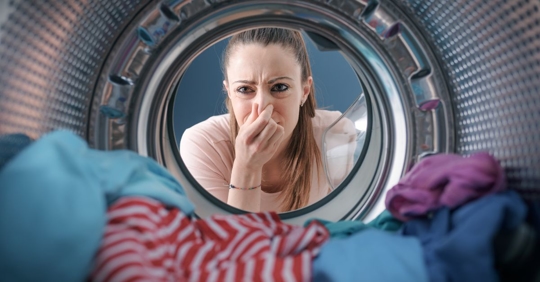Accumulation of Residue and Detergent Build-Up
Washing machines, while designed for cleanliness, can ironically become a breeding ground for grime and unpleasant odors. One of the primary culprits behind this paradox is the accumulation of residue from detergent and fabric softeners. When these substances aren't fully rinsed away, they leave behind a sticky film. This residue not only traps dirt but also provides a fertile ground for bacteria growth, leading to persistent odorous issues inside your machine. Many users inadvertently exacerbate the problem by using too much detergent; more isn't always better. Particularly in front-loading machines, which use significantly less water than their top-loading counterparts, excessive detergent can create more suds than the machine can rinse away. Switching to high-efficiency (HE) detergents might just be the key to minimizing this build-up and keeping those undesirable smells at bay.
Growth of Mold and Mildew
Another notorious source of unpleasant smells stems from mold and mildew. These unwelcome intruders thrive in the warm, damp conditions that washing machines inherently provide. The seals, gaskets, and other less visible areas of the machine are particularly susceptible. As moisture remains trapped in these nooks and crannies, it creates an ideal environment for mold spores to settle and grow. Regular maintenance is essential to combat this proliferation. Ensuring these areas are wiped dry after use and allowing them to be exposed to air can drastically reduce the potential for mold growth. Addressing these conditions proactively can save one from the unpleasant task of battling mold and ensure a fresh-smelling machine.
Regular Cleaning Routines
Initiating a consistent cleaning routine can work wonders in keeping washing machine odors at bay. An easy method to start this routine is by running an empty wash cycle with hot water. Adding a cup of white vinegar or utilizing a specialized washing machine cleaning solution can further help in breaking down the residue and killing bacteria that contribute to smells. By setting aside time each month for this basic maintenance, homeowners can significantly reduce the accumulation of odor-causing residues. Consistent cleaning not only maintains freshness but also prevents minor issues from evolving into bigger, costlier problems over time.
Proper Loading Techniques
Proper loading techniques can play an unexpectedly significant role in odor prevention. Many may not realize that overloading a machine can thwart its ability to effectively rinse and spin clothes. Without adequate space for movement, clothes can trap water, leading to increased moisture retention and odor creation. Following the manufacturer's recommended load sizes ensures that garments are sufficiently agitated and rinsed. Optimal water flow during these cycles helps to remove detergent and grime effectively, minimizing residue build-up. By adhering to these best practices, homeowners protect their machine while ensuring their laundry remains fresh and clean.
Keeping the Door Open Post-Cycle
Simple steps can have profound impacts, like keeping the washing machine door ajar between uses. This act facilitates air circulation and helps the interior compartments to dry out completely. It significantly diminishes the likelihood of mold and mildew formation—a common source of washing machine odors. Proactively encouraging ventilation post-cycle might just be the simplest, yet most effective, tactic in promoting an odor-free laundry room. It's an easy adjustment in habit that can yield lasting benefits in maintaining machine health and hygiene.
Using Natural Remedies
When faced with existing odors in a washing machine, natural remedies offer an affordable and environmentally friendly solution. Household items like baking soda, white vinegar, and lemon juice possess potent odor-neutralizing properties. For instance, a combined cycle featuring one cup of vinegar followed by half a cup of baking soda can effectively sanitize and refresh the internal components of the machine. Alternatively, lemon juice not only cleans but also leaves behind a pleasant aroma. These simple solutions are effective without using harsh chemicals, proving that sometimes, nature provides the best answers to our appliance woes.
Specialized Cleaning Products
For those who prefer commercially available solutions, specialized washing machine cleaners are designed to tackle tough odors and break down stubborn build-up. Products like Affresh and Tide Washing Machine Cleaner have gained popularity for their efficacy. These cleaners often combine enzyme-based action with mild abrasives to ensure a thorough cleanse. While household solutions are effective, these specialized products are formulated to target the specific types of grime that washing machines tend to accumulate. Evaluating a few different options and understanding their pros and cons can help in selecting the most suitable one for your machine’s needs.
Professional Cleaning Services
Occasionally, the stubbornness of washing machine odors may require more expertise than DIY methods can provide. Calling in professional cleaning services might be the necessary step, especially for persistent or severe problems. These experts utilize advanced techniques to access hard-to-reach areas and provide a deep clean far beyond what one might achieve at home. In such scenarios, professional intervention not only eliminates the current issue but provides insights into prevention strategies and uses diagnostics to forestall future problems. It can be a wise investment in extending the longevity of your machine and ensuring it functions optimally.
Routine Part Inspections
An odor-free washing machine relies heavily on regular routine inspections of its various parts. Key components like seals, dispensers, and filters benefit immensely from being consistently checked and cleaned. Seals can harbor mold if neglected, dispensers can accumulate detergent residue, and filters can become clogged, each contributing to unpleasant smells. By dedicating attention to these areas every few weeks, homeowners can thwart the development of odor issues before they escalate. Such diligent upkeep not only maintains freshness but also extends the operational lifespan of the appliance.
Water Quality Considerations
Sometimes, the cause of washing machine odors could stem from an unexpected source—your water quality. Hard water, rich in minerals like calcium and magnesium, tends to leave deposits in machines over time. This can escalate to obstructions and build-up, both potential odor culprits. Investing in water softeners or committing to regular descaling can proactively mitigate these challenges. Addressing water quality concerns ensures both the washing machine and clothing maintain their cleanliness and functionality, reinforcing the importance of clean, soft water as a foundational element of effective laundry care.
Frequent Use of Maintenance Washes
Incorporating frequent maintenance washes into one's routine is an effective practice for sustaining an odor-free washing machine environment. These cycles, typically run with hot water and branded cleaning agents, work to cleanse the machine internally and maintain a hygienic state. Not only do they help clear any accumulating residue, but they also ensure that mold, mildew, and bacteria do not gain a foothold. Such consistency supports an ongoing process of cleanliness, promoting longevity, and machine health, with minimal effort required from the user.
Common Concerns and Misconceptions
Addressing frequent laundry myths can demystify the process of preventing washing machine odors. For instance, some users worry that cold water washes lead to increased odor issues. While hot water is more effective at killing bacteria, regular maintenance washes can counteract the drawbacks of cold cycles. Additionally, debating whether certain detergent types are superior for odor control often crops up. While HE detergents are preferred for their efficiency, ensuring full rinse cycles matter more significantly in controlling residue build-up and the associated smells.
Eco-Friendly Approaches
With sustainability becoming an increasing priority, eco-friendly approaches to odor prevention are gaining traction. Opting for green detergents, which break down more easily in water, can significantly reduce residues left in the machine. Moreover, natural cleaning agents like vinegar and baking soda not only freshen machines but are also biodegradable and gentle on the environment. These practices marry machine upkeep with environmentally conscious choices, presenting a holistic method of maintaining laundry freshness that aligns with eco-values.
Long-term Storage Tips
For those facing periods of non-use, long-term storage of a washing machine requires special care to prevent odors. Ensuring all water is drained is paramount, as stagnant liquid can quickly become odorous. The interior should be thoroughly dried, and dispensers and seals checked for lingering moisture. Adopting these steps ensures that upon resuming usage, the washing machine remains as fresh as when left, with no surprise smells when opened.
Get Rid of Smelly Washing Machines with Affordable Appliance Repair
At Affordable Appliance Repair, we understand the crucial role of well-maintained appliances in keeping your home running smoothly. If you're facing persistent washing machine odors despite your best efforts, don’t hesitate to reach out. Our expert technicians are ready to assist, providing both thorough cleaning and valuable services to keep your washing machine in top condition. Contact us today to experience quality service and ensure your laundry space stays fresh and inviting.
Call Affordable Appliance Repair now at (480) 914-3381 or send us a message online.


